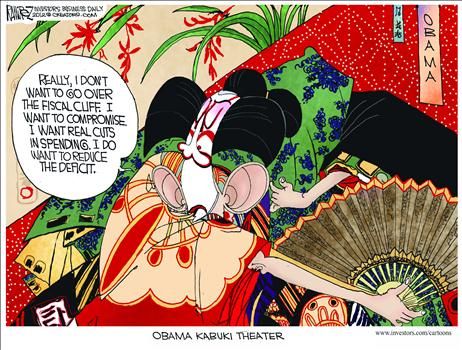
By Michael Auslin
Amid the oceans of
spilled ink on U.S. government dysfunction, Democratic cynicism, GOP
collapse, etc., the simplest point seems to be lost. We have a yawning
chasm between the macroeconomic deficit and the microeconomic effect of
higher taxes on individuals and businesses. Politics has become so
un-moored from reality, or dismissive of its responsibility to the
commonweal, that the mind-boggling details of political maneuver, debt
ceilings, and a byzantine tax code miss the forest for the trees. As
Zero Hedge shows in one simple graph,
absolutely nothing on the table will come within light years of solving
our deficit problem, let alone the debt. On the other hand, each and
every individual will feel the bite of new taxes, and not just those
making $400,000 or more per year. Expiration of the payroll-tax cut and
Obamacare taxes starting today are the most prominent example, though
they’ve been nearly absent from any breathless cable coverage of the
fiscal-cliff negotiations. Representative Jeff Duncan’s website has a handy list (compiled by ATR) of how much more we’ll be paying on the Obamacare front alone, either directly or indirectly.
Here’s a proposition: It is immoral to make individuals (no matter how wealthy) pay any more in taxes if those “revenues” are not part of a serious plan that will make an appreciable reduction in the deficit. Stop talking about spending, since no one uninfected by Beltway Syndrome (B.S., for short) seriously believes there will ever be any reduction. Instead, go back to the old, yet morally sound strategy of starving the beast (the same holds true for Obamacare). Where is the principled conservative argument against wasting the fruits of people’s livelihoods? Maybe we need reeducation in old aphorisms such as “don’t pour good money after bad.” Where is the basic understanding that each individual will make significant choices to reduce spending, take on new debt, stop working, work harder, or whatever, based on how they must deal with the burden of new payments to the government? What government “leader” has even a basic appreciation of the effect of higher taxes on economic life in the aggregate? They can talk for years about the macro issue, but are silent on the micro issue.
All that may sound too simplistic to political and economic experts, but we have crossed the Rubicon of political reality. The president holds a cheerleading session to ridicule Congress, not one plan offered makes even the smallest dent in our economic disaster, cynical political ploys by Harry Reid torpedo possible agreements — all these petty politicians fiddle while America burns. And then, we’re supposed to believe that a last-second deal responsibly solves the problem from a bunch of bickerers who had months (years, really) to tackle the issue?
Our crisis is political, not economic. Politics is ultimately a moral exercise, no matter what it deals with. Leaders are stewards of our social patrimony. What we see in Washington today is not gridlock. It is collapse. It is the final triumph of political theater over political reality, of ignorance over reasoned governing, of self-interest over principle. A $12 trillion economy and 230-plus-year history can survive a great deal of abuse and neglect. But history proves no state is immune from the self-inflicted idiocy of its leaders or people. Just how long we will survive in this state is now a proposition fully engaged. It is the great social experiment of the 21st century.
No comments:
Post a Comment